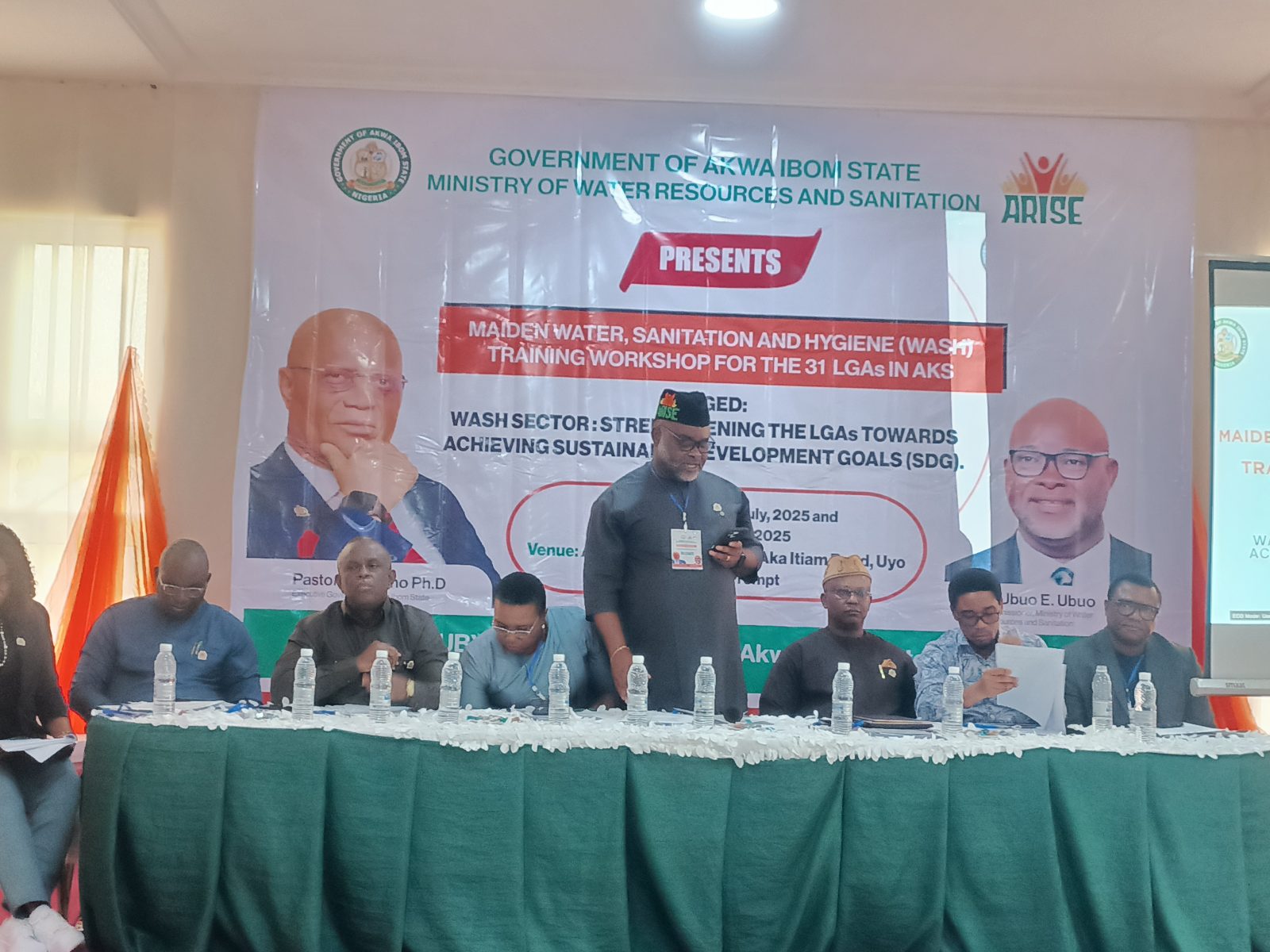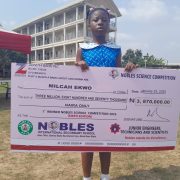A’Ibom Govt Takes Bold Steps to Revitalize WASH Sector

By Ekemini Simon
The Government of Akwa Ibom State has taken bold steps towards the revitalization of the Water Sanitation and Hygiene sector in the State with the latest effort being the development of a draft State Action Plan (SAP) on the revitalization of the WASH sector complete with resolutions that will guide government efforts in improving WASH services and governance across local government areas in the State.
The stride was part of the two-day maiden WASH training workshop for the 31 local government areas in Akwa Ibom State held in Uyo on Thursday through Friday.
The draft SAP is coming on the heels of State Executive Council ratification of three major WASH documents, which include Akwa Ibom State WASH Policy, Akwa Ibom State WASH Monitoring and Evaluation Framework as well as Roadmap for Making Akwa Ibm State Open Defecation Free by 2030.
In his welcome address at the workshop, the Commissioner, Ministry of Water Resources and Sanitation, Hon. Ubuo Ubuo said the three ratified documents in addition to the Akwa Ibom State Water Resources Sector Management and Regulation Law 2022 are crucial for the reforms in the WASH sector in terms of governance and infrastructure provisions.
He said the documents have provided roles and responsibilities, created and established structures at state, local and community levels among other provisions for management of WASH activities in the State.
While noting that the ARISE agenda of the Umo Eno’s administration emphasizes the importance of improving access to basic services, including water and sanitation, the Commissioner said the workshop is designed to equip Local Government leaders and stakeholders with the knowledge, skills and tools necessary to strengthen their WASH governance and service delivery, ultimately contributing to the achievement of Sustainable Development Goals (SDGs), especially SDG 6- Clean Water and Sanitation.
Ubuo said through the workshop, experience will be shared, innovative solutions to address the WASH challenges in the State will be explored coupled with the development of a draft State Action Plan on the revitalization of the WASH sector complete with resolutions that will guide efforts in improving WASH services and governance.
He added ” By prioritizing people, participation and accountability, we can ensure that our WASH initiatives are responsive to community needs, inclusive and sustainable.
“I am confident that this workshop will be a significant milestone in our journey towards revitalizing the WASH sector in Akwa Ibom State. I look forward to seeing the outcomes of our deliberations and working together to implement the State Action Plan that will emerge from the workshop.”
In his keynote address on WASH governance in local government areas, the Head of Service, Elder Effiong Essien said for effective WASH governance in Local Government Areas of Akwa Ibom State, seven approaches must be implemented. They are demand-driven bottom-up approach, community-led total sanitation, capacity building, partnerships and collaborations, monitoring and evaluation, and decentralization.
Explaining the demand-driven bottom-up approach, the Head of Service said this approach fosters active participation and decision making by local communities in WASH service delivery; prioritizes community-identified needs and demand, ensuring WASH services are tailored to local needs; as well as encourages community ownership and responsibility for WASH services, thereby promoting sustainability.
On the Community-Led Total Sanitation (CLTS), Essien said this approach empowers communities to take ownership of sanitation improvements, promotes community-led initiatives to eliminate open defecation. He noted that this was adopted and used during the NDSP era by AK-RUWATSAN which eventually led to declaration of Nsit Atai as open defecation free LGA.
On capacity building, the keynote presenter said this approach enhances skills and knowledge of LGA officials and community members to manage and maintain their WASH services for sustainability. He said the officials of the WASH Departments, the Local Government Task Group on Sanitation, LGA WASH Steering Committee and other relevant CSOs need to constantly be updated.
Essien added “Partnerships and Collaborations: Partnership between Local Governments, communities, NGOs and private sector actors will help in leveraging resources and expertise that enhance the effectiveness and sustainability of WASH services
“Monitoring and Evaluation: This is necessary for the provision of accurate information on processes and determining effectiveness and efficiency of all implementation activities in delivering planned results in the sector. It is also important in the identification of gaps through research and areas for improvement and decision-making.
Inclusive and Equitable Approach: This approach ensures that WASH services are accessible and affordable for all, with priority to the needs of the vulnerable and marginalized groups. Decision-making processes need to be participatory to build trust and foster co-creation.
“Decentralization: This involves transferring authority, responsibility and resources from the Central government to local governments or organizations to implement WASH activities. This will enhance accountability, efficiency and increased participation as local governments are the closest to the people or grassroots. The 1999 Constitution of the Federal Republic of Nigeria (as amended) indicates that local governments are responsible for: Provision and maintenance of public conveniences, sewage and refuse disposal services. Participate in the State Government regarding matters such as the provision and maintenance of primary healthcare services, which can impact WASH governance”
The Head of Service said by leveraging the provisions of the Akwa Ibom Water Resources Sector Management and Regulation Law 2022, and implementing the WASH Policy, ODF Roadmap and WASH Monitoring and Evaluation Framework, financial autonomy granted LGAs, capacity building, community engagement and partnership, Akwa Ibom State can improve WASH service delivery and achieve lasting impact in terms of enhanced water and sanitation, environmental protection, improved public health and better living condition of our people.
The workshop featured paper presentations on various aspects of the WASH sector, including: “The Sustainable Development Goals” by Prof.Thomas Harry, “Definitions and Strategies for Water, Sanitation and Hygiene” by Dr Ubong Douglas, “WASH Sector Institutional and Regulatory Framework” by Prof.Gabriel Umoh“Sanitation, Hygiene, and ODF Protocols in Akwa Ibom State: A Case Study” by Mr. Saviour Udoh.







